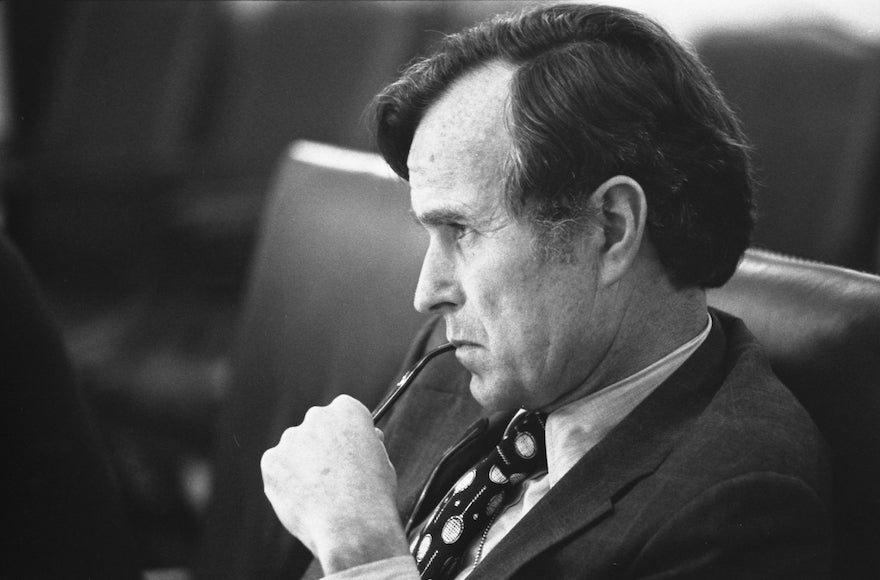Vice President George Bush denounced the three Democratic Presidential hopefuls today for not speaking out against the anti-Semitism expressed by Louis Farrakhan, the Black Muslim leader who is a leading supporter of the Rev. Jesse Jackson. (See related story, P. 3.)
“We (President Reagan and members of his Administration) denounce the intrusion of anti-Semitism into the American political process and believe it has no place in our system, and we’ve got to speak out against it wherever it comes from,” Bush told the 1,000 persons attending the 25th annual policy conference of the American Israel Public Affairs Committee (AIPAC) at the Washington Hilton Hotel.
The Vice President who received a standing ovation for his remarks, noted that Jackson has been criticized not only for failing to disassociate himself from Farrakhan but also for claiming no responsibility in the affair. Jackson yesterday disassociated himself from Farrakhan’s remarks threatening a Black journalist, Milton Coleman of The Washington Post, and the Jewish community earlier, but refused to reject Farrakhan’s support.
Farrakhan, head of the Nation of Islam group, warned Jews that if Jackson is harmed for his reference to Jews as “Hymies” and New York as “Hymietown,” “this will be the last (brother) you harm.” He later vowed to “punish” Coleman for having revealed that Jackson had used these terms.
‘ANTI-SEMITISM … IS A DISGUSTING DISEASE’
“As shocking as I find Rev. Jackson’s behavior, I also cannot understand why the other two candidates are not willing to speak out,” Bush said. Although Bush had named former Vice President Walter Mondale and Sen. Gary Hart (D. Colo.) in his prepared text, he did not mention them by name when he delivered his speech.
“Anti-Semitism, wherever it appears, is a disgusting disease, but particularly when it appears in our country where its presence defiles our most sacred traditions and institutions,” Bush said.
Earlier in his speech to the AIPAC conference, Bush noted that under the Reagan Administration the American delegation to the United Nations no longer sits quietly when anti-Semitic attacks are made against Israel in the UN. “We will not shrug such talk off as mere rhetoric,” Bush said. “And our Ambassador, Jeane Kirkpatrick, will not let stand unchallenged equations of Zionism with racism.”
STRESSES U.S.-ISRAEL STRATEGIC COOPERATION
Most of the Vice President’s speech was devoted to stressing that there is a “new mood of assuredness” in American foreign policy since the Reagan Administration came to office and “more, perhaps, than any other country, Israel has benefitted directly from this.
Bush stressed that in the new strategic cooperation between Israel and the U.S., “for the first time the U.S. has acknowledged what Israel has always been –our foremost strategic friend in the Middle East. And this in turn confirms America’s long-standing commitment to ensure Israel’s qualitative edge in armaments over any potential combination of adversaries.”
He noted that in addition, Israel will now be receiving for the first time, all its military and economic aid as grants to “ensure that maintaining that edge doesn’t bankrupt Israel’s economy.”
CITES NEED FOR EVEN-HANDED POLICY
Bush stressed that Reagan is still committed to his September 1, 1982, peace initiative and the belief that the U.S. can be an “honest broker” in Middle East negotiations. But he stressed that the U.S. needs to supply arms to Saudi Arabia and Jordan as well as to the friendly Persian Gulf states so that they “not be left to the mercy of the radical states in the region” but are able to defend themselves.
“Despite setbacks in Lebanon and King Hussein’s recent decisions, we believe that the time will come when all sides will see a negotiated settlement in their best interests,” Bush said. “When the moment does arrive, it is overwhelmingly in Israel’s interests for the U.S. to act as the honest broker, just as it has in the past.”
STATES POSITION ON EMBASSY MOVE
But, Bush warned, “few actions could more undermine our capacity to play that brokers role with the Arab states than for the U.S. precipitously to move its Embassy from Tel Aviv to Jerusalem. Jerusalem is just too emotionally charged a symbol for Moslems as well as Christians and Jews. The U.S. position is clear: while Jerusalem must remain undivided, its final status can only be resolved in negotiations, not through unilateral acts.” He added that the U.S. “will never attempt to impose a settlement.”
Bush also stressed, “It is in Israel’s interests to see American economically and militarily strong. And yet some, who loudly profess to be Israel’s strongest friends, are leading the charge to weaken the defense budget in this country.”
The Vice President criticized those who “spend so much time slamming our policies in Central America on human rights grounds” but have not spoken out when “the regime in Nicaragua has driven practically every Nicaraguan Jew out of the country.”
Bush also said that if the Soviet Union “wants to signal us that it is truly interested in a thawing of relationship,” they can do so by ending their harassment of Soviet Jews. “And they understand as well that whenever, wherever, on whatever topic they may meet with us, the issue of Soviet Jewry is potentially on the table,” he said.
JTA has documented Jewish history in real-time for over a century. Keep our journalism strong by joining us in supporting independent, award-winning reporting.
The Archive of the Jewish Telegraphic Agency includes articles published from 1923 to 2008. Archive stories reflect the journalistic standards and practices of the time they were published.




